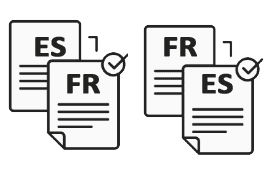French is one of the most spoken languages in the world. As a result, it is present in more than 29 countries and is official in organizations such as the UN and the European Union. For this reason, its relevance in business, law, and education makes French translations essential. In particular, companies, professionals, and individuals need to communicate with precision and fluency.
In this article, we will explore the importance of French translations, their most common types, and some key tips to ensure quality work.
Moreover, if you are also interested in learning about English translations, we have detailed information on that as well.

Why are French translations important?
French translations are key in many areas, from business to education and diplomacy. Here are some fundamental reasons:
Firstly, French translation is crucial for international communication, with over 300 million speakers worldwide.
Additionally, companies operating in France, Belgium, Switzerland, or Canada need precise French translations for contracts, advertising, and legal documents. This way, they can ensure clear and effective communication.
Furthermore, certificates, diplomas, and contracts must be translated into French to be valid before government agencies. Consequently, having a professional French translator is essential.
In terms of tourism, France is one of the most visited destinations. Therefore, there is a high demand for French translations for tourist guides, websites, and promotional materials.
Moreover, French-speaking universities and research centers require French translations of articles, theses, and academic publications. As a result, many scientific journals accept papers in French, broadening dissemination opportunities.
Types of French Translations
French translations cover many specialized areas. Here are the most common ones:
- Certified French Translation
This is required for official documents with legal validity. For example:- Birth, marriage, or criminal record certificates.
- Contracts and notarial documents.
- Diplomas and academic certificates.
- Technical Translation
Used for documents with specialized terminology, such as:- Engineering and technology.
- Medicine and pharmaceuticals.
- User manuals and technical guides. In these cases, accuracy is crucial.
- Business and Corporate Translation
Companies looking to expand into French-speaking markets require French translations for:- Presentations and financial reports.
- Marketing and advertising materials.
- Websites and e-commerce. This way, they can reach more potential customers.
- Literary and Audiovisual Translation
Applied to creative texts and multimedia content:- Books and novels.
- Subtitles and dubbing for movies and TV shows.
- Digital content and social media. In this case, the translator’s creativity is key.
Tips for Getting a Quality French Translation
To ensure an accurate and professional French translation, it is important to follow these tips:
Firstly, hire a professional translator: Precision and fluency in French translation can only be achieved with a native translator or one with extensive experience in the language.
Additionally, verify the translator’s specialization: Each sector has its own terminology. Therefore, it’s essential to choose a translator with specific knowledge in that area.
Moreover, use supporting tools: While artificial intelligence has advanced, automatic translations cannot replace the quality and context provided by a human translator.
Next, review and correct: Every French translation must go through a review process to avoid grammatical or meaning errors. This ensures a professional job.
Finally, adapt to the target audience: It is important to note that translating an academic text is not the same as translating an advertisement. Therefore, cultural adaptation is essential to ensure the message is effective.
Where to Find French Translation Services
If you need French translations, you can turn to different options depending on your needs:
- Translation agencies: They offer specialized services and generally have certified translators. As a result, they are ideal for complex projects or official documents.
- Freelance translators: Independent professionals who can provide more flexible rates and personalized attention.
- Online translation platforms: Tools like ProZ, Upwork, or Fiverr can help you find specialized translators. This way, you can compare options and choose the most suitable one.
Conclusion
French translations are essential for companies, institutions, and individuals who want to communicate efficiently in French-speaking markets. Therefore, working with a professional and specialized translator ensures the accuracy and quality of the translated content, preventing misunderstandings and ensuring that the message reaches the target audience effectively.
If you need reliable and accurate French translation, make sure to choose a professional with experience in your field and the proper linguistic knowledge for each type of document or content. This way, your message will reach the target audience correctly.




